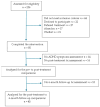Impacts of ADHD Symptomatology on the Response to Cognitive-Behavioural Therapy with Gilles de la Tourette Syndrome Patients
- PMID: 38792517
- PMCID: PMC11122476
- DOI: 10.3390/jcm13102975
Impacts of ADHD Symptomatology on the Response to Cognitive-Behavioural Therapy with Gilles de la Tourette Syndrome Patients
Abstract
(1) Background: Gilles de la Tourette Syndrome (TS) is a neurodevelopmental disorder characterized by motor and vocal tics. Attention deficit and hyperactivity disorder (ADHD) is a common comorbidity of TS that adds further impairment. Cognitive-behavioural therapy (CBT) has shown efficacy in treating tics, yet its effectiveness in individuals with TS and comorbid ADHD remains unclear. Also, it is suggested that ADHD characteristics like executive dysfunction and inattention could hinder the response to CBT. This study aims to compare the response to CBT for tics and its maintenance six months post-therapy among TS individuals with and without ADHD symptoms. (2) Methods: In this study, 55 TS participants who completed 14-week CBT for tics were split into high (TS+) or low (TS-) ADHD symptomatology groups. Outcomes were evaluated using the Yale Global Tic Severity Scale (YGTSS) regarding global tic severity and motor and vocal tic frequency post-CBT and at a 6-month follow-up. (3) Results: No significant group difference was found regarding improvements post-CBT (n = 55), nor the maintenance six months later (n = 45). (4) Conclusions: ADHD symptoms may not hinder the response to CBT or its maintenance, suggesting that TS individuals with ADHD symptoms may not require specialized CBT interventions.
Keywords: CAARS; CBT; YGTSS; chronic tics; tic disorders.
Conflict of interest statement
The authors declare no conflicts of interest. The funders had no role in the study’s design; in the collection, analyses, or interpretation of data; in the writing of the manuscript; or in the decision to publish the results.
References
-
- Wong D.F., Brasić J.R., Singer H.S., Schretlen D.J., Kuwabara H., Zhou Y., Nandi A., Maris M.A., Alexander M., Ye W., et al. Mechanisms of dopaminergic and serotonergic neurotransmission in Tourette syndrome: Clues from an in vivo neurochemistry study with PET. Neuropsychopharmacol. Off. Publ. Am. Coll. Neuropsychopharmacol. 2008;33:1239–1251. doi: 10.1038/sj.npp.1301528. - DOI - PMC - PubMed
-
- American Psychiatric Association . Diagnostic and Statistical Manual of Mental Disorders. 5th ed. American Psychiatric Publishing; Washington, DC, USA: 2013. Neurodevelopmental Disorders; pp. 31–85. - DOI
Grants and funding
LinkOut - more resources
Full Text Sources


